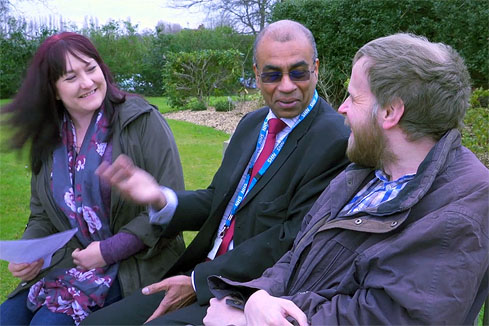
Also known as learning disability psychiatry, the psychiatry of intellectual disabilities involves working with people with learning disabilities, who are much more likely than the general population to experience mental health conditions.
Psychiatrists treat severe mental illness as well as a range of other mental health conditions, such as autistic spectrum disorders and anxiety disorders.
People may have physical problems and often present non-specifically (for example with withdrawal or behaviour problems) and finding out the cause is a fascinating diagnostic challenge.
It is also essential to consider the system around the person (such as family, support staff) to understand clinical problems.
Career roles and progression
Medical degree
Courses normally last five years, or four years for a graduate entry programme. They involve basic medical sciences as well as clinical training on the wards. Individual universities will set their entry requirements and you can apply for a medical degree through UCAS.
Foundation training
After graduation, a two-year integrated foundation training programme is mandatory for anyone who wants to become a doctor in the United Kingdom. It acts as a bridge between undergraduate and specialty training and gives doctors in training the practical and theoretical skills and they need to manage acutely ill patients. Full medical registration is awarded after the completion of year one.
You will receive a salary during foundation training.
Core training
In the specialty of psychiatry, the core training programme lasts three years. During this time, the doctor in training must pass the member of the Royal College of Psychiatrists examination in order to complete the core training. This is followed by an open competition to enter a higher specialty training post. It is important to note that the application following core training is competitive and does not guarantee a specialty training post.
Higher training Higher psychiatry training is a three-year programme and reflects the sub-specialty you have chosen – in this case psychiatry of intellectual disabilities – however there will also be opportunities to work in other sub-specialties such as forensics, neuropsychiatry, and social and rehabilitation psychiatry. A certificate of completion of training (CCT) is awarded on successful completion of the higher training programme and you will be entered onto the General Medical Council’s Specialist Register.
Consultant posts
Once you have your certificate of completion of training you can apply for a consultant post, which means you can work independently and may lead a multi-professional team.
Speciality or Associate Specialist Doctors
In learning disability psychiatry, some doctors are neither doctors in training nor consultants, and are working in Specialty or Associate Specialist (SAS) posts. They may have chosen this route for a variety of reasons and are required to be responsible to a named consultant. There is a route to a consultant post from an specialty or associate specialist post, should the doctor wish to progress in this manner, known as the Certificate of Entry onto the Specialist Register (CESR).
| Role | Degree? |
|---|---|
| Staff, Associate Speciality and Speciality (SAS) Doctor Staff, Associate Specialist and Speciality doctor posts in learning disability psychiatry offer the opportunity to focus more on providing direct patient care and less on the non-clinical responsibilities required of a consultant or trainee. Depending on their personal interests and experience – and the available opportunities in their trust and specialty – staff, associate specialist and speciality doctors can be involved in teaching, service development, research, or management and leadership. Learning disability psychiatry offers a great deal of opportunity for a high degree of autonomous working to experienced staff, associate specialist, and speciality doctors. | Yes |
| Consultant When you have completed your higher speciality training, you will receive your CCT (Certificate of Completion of Training), which makes you eligible to work as a consultant learning disability psychiatrist. | Yes |
Why choose learning psychiatrists
A career in learning disability psychiatry is rewarding, varied, and interesting, and offers ample opportunity for flexible working, thus making it an extremely family-friendly speciality.
Where psychiatrists can work
In this field, you are very likely to be working in a community setting such as a clinic or even someone’s home.
Some psychiatrists work in hospital environments with patients who have been admitted for treatment of severe mental health conditions. Some of these patients will be detained under the Mental Health Act.